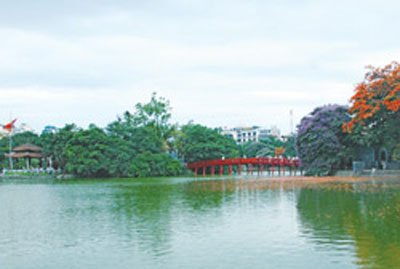
|
| A view of the Hoan Kiem Lake in Ha Noi. Environmental experts said that the city's lakes could be better protected with co-operation from the State and local residents. (Photo: VNS) |
He said the situation could get worse by 2020, when 45 per cent of Viet Nam's population was expected to be living in urban areas. Climate change could also affect lake ecosystems as river levels rose.
Deputy director of the Viet Nam Environment Administration Hoang Duong Tung said unless there was consensus from the community, Viet Nam would fail to save its remaining local lakes.
Local lakes need to be protected not only by State agencies, but local residents, Tung said at the first international workshop on protecting Ha Noi's lakes yesterday. About 150 people attended.
"We have planned to launch programmes to provide full information about the value of lakes through the mass media and community associations," he said.
Last June, the Centre for Environment and Community Research opened a website www.cecr.vn to build a network of local people interested in the future of the lakes.
Ngoc Khanh Ward's Women Union teamed up with the US Embassy and the centre to clean up Ngoc Khanh Lake on Earth Day this year.
Nguyen Ngoc Ly, the centre's director, said people still threw ash from burned votive paper products into lakes because they believed it would bring luck.
However, the ash created negative impacts on the ecosystem of lakes, she said.
Ly said that, however, the lakes were a natural way for people to understand the environment and society they had helped create.
Many of the lakes were made permanent by ancient authorities to store water and prevent floods, Ly said.
"To improve the lakes, we need to solve shortcomings in public awareness, find environmental polices and financial policies to suit the times - and develop co-operation between People's Committees and the community," Ly said.
A survey released by the centre shows the capital city now has 120 lakes covering about 6.2 square kilometres in six districts. However, about 70 per cent of lakes are polluted, many heavily.
To curb the situation, in 2009, the city People's Committee began dredging lakes, including Ba Mau, Bay Mau, Dong Da, Thien Quang and Truc Bach.
In another move, last July the Government approved a master plan for the city setting aside 70 per cent of total space as "green".
Deputy head of the Ministry of Construction's Urban Development Department Do Tu Lan said each locality should be compelled to take responsibly for the quality of lake water.
Environmental experts from the United States, South Korea and Hungary shared their experiences from efforts to protect lakes in their countries at the workshop.
VietNamNet/Viet Nam News